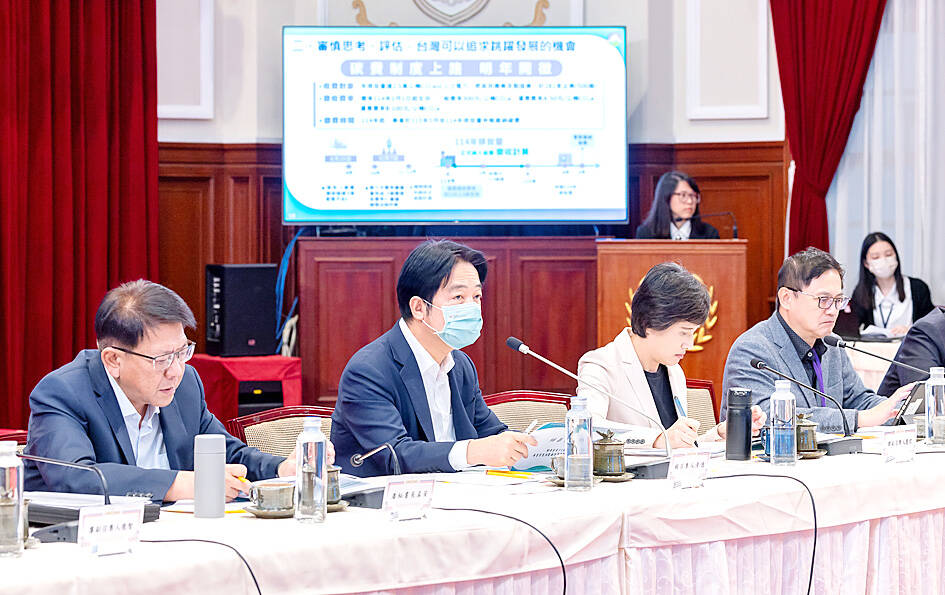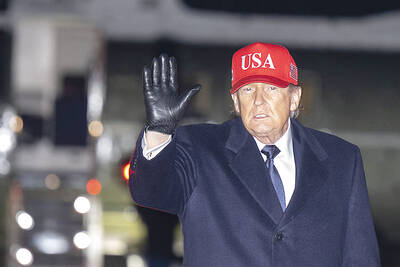The government should provide more incentives to invest in energy-saving technology and equipment, business representatives told a news conference after a climate change committee meeting on Thursday.
Paul Peng (彭浪), chairman of LCD maker AUO Corp, during the meeting called for more incentives for companies to invest in energy storage and energy-saving technology, Presidential Office Deputy Secretary-General Xavier Chang (張淳涵) said.
Lai Po-szu (賴博司), chairman of the Manufacturers United General Association of Industrial Park of ROC, told the meeting that incentives such as tax credits would motivate big and small businesses to double down on efforts to save energy, Chang said.

Photo courtesy of the Presidential Office
Peng and Lai are members of the National Climate Change Committee, which convened at the Presidential Office for the second time since its establishment in June.
Vice Minister of Economic Affairs Lien Ching-chang (連錦漳) said that the government has plans to revise laws, particularly the Statute for Industrial Innovation (產業創新條例), to increase funding aimed at incentivizing enterprises to save energy.
He was referring to proposed revisions — which still require legislative approval — announced on Oct. 4 by the Ministry of Economic Affairs.
Among the proposed amendments is a plan to increase the cap on investments in industrial structure optimization that qualify for tax credits to NT$1.8 billion (US$56.13 million) from NT$1 billion.
Saving energy and reducing carbon emissions were the focus of Thursday’s talks, with government officials reaffirming the goal of saving 20.6 billion kilowatt-hours (kWh), or about 7.3 percent of the electricity generated last year, over four years.
That would reduce carbon emissions by about 10.18 million tonnes, according to government estimates.
In the first eight months of this year, electricity generation was up 2.3 percent from the same period last year.
Minister of Environment Peng Chi-ming (彭啟明) told the meeting that the government aims to update its carbon reduction targets in the period leading up to 2032 to reflect more ambitious net zero goals.
Hopefully the government would finalize a “flagship program,” including new goals in the years leading up to 2032 and beyond, as well as updated measures to reduce carbon emissions with “greater ambition,” Peng said in his presentation before the committee entered closed-door discussions.
The nation’s goal is to reduce emissions by 23 to 25 percent by 2030 compared with the 2005 levels.
Although Taiwan was on the right track, the new goals would “make the figures look better,” provided the yet-to-be-announced “flagship program” was well implemented, Peng said.
Peng’s comments appeared to be a departure from those he made in an interview in August, when he said that Taiwan only reduced its carbon emissions by 1.8 percent in 2022 compared with 2005 levels and that reaching the 2030 goal would “in reality be hard.”
During his presentation, the minister did not provide details on what the “flagship program” would entail, but said that it would focus on developing more green energy sources, charging carbon fees and saving energy.
The committee serves as a policy advisory group, with ideas and suggestions made during its meetings referred to Cabinet-level agencies for further planning and implementation.
The committee is presided over by President William Lai (賴清德) and has about 30 members, including government officials, academics, and representatives of businesses and civil society groups.

Taiwan has received more than US$70 million in royalties as of the end of last year from developing the F-16V jet as countries worldwide purchase or upgrade to this popular model, government and military officials said on Saturday. Taiwan funded the development of the F-16V jet and ended up the sole investor as other countries withdrew from the program. Now the F-16V is increasingly popular and countries must pay Taiwan a percentage in royalties when they purchase new F-16V aircraft or upgrade older F-16 models. The next five years are expected to be the peak for these royalties, with Taiwan potentially earning

STAY IN YOUR LANE: As the US and Israel attack Iran, the ministry has warned China not to overstep by including Taiwanese citizens in its evacuation orders The Ministry of Foreign Affairs (MOFA) yesterday rebuked a statement by China’s embassy in Israel that it would evacuate Taiwanese holders of Chinese travel documents from Israel amid the latter’s escalating conflict with Iran. Tensions have risen across the Middle East in the wake of US and Israeli airstrikes on Iran beginning Saturday. China subsequently issued an evacuation notice for its citizens. In a news release, the Chinese embassy in Israel said holders of “Taiwan compatriot permits (台胞證)” issued to Taiwanese nationals by Chinese authorities for travel to China — could register for evacuation to Egypt. In Taipei, the ministry yesterday said Taiwan

‘LIKE-MINDED PARTNER’: Tako van Popta said it would be inappropriate to delay signing the deal with Taiwan because of China, adding he would promote the issue Canadian senators have stressed Taiwan’s importance for international trade and expressed enthusiasm for ensuring the Taiwan-Canada trade cooperation framework agreement is implemented this year. Representative to Canada Harry Tseng (曾厚仁) in an interview with the Central News Agency (CNA) said he was increasingly uneasy about Ottawa’s delays in signing the agreement, especially as Ottawa has warmed toward Beijing. There are “no negotiations left. Not only [is it] initialed, we have three versions of the text ready: English, French and Mandarin,” Tseng said. “That tells you how close we are to the final signature.” Tseng said that he hoped Canadian Prime Minister Mark Carney

The US’ joint strikes with Israel on Iran dismantled a key pillar of China’s regional strategy, removing an important piece in Beijing’s potential Taiwan Strait scenario, said Zineb Riboua, a senior researcher at the Hudson Institute’s Center for Middle East Peace and Security. In an article titled: “The Iran Question Is All About China,” Riboua said that understanding the Iran issue in the context of China’s “grand strategy” is essential to fully grasp the complexity of the situation. Beijing has spent billions of dollars over the years turning Iran into a “structural strategic asset,” diverting US military resources in the